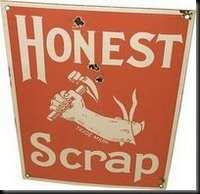Of late, I have been thinking a great deal about theocracy and how it continues its intrepid creep into every corner of American political life and, unfortunately, the media. This is especially noticeable in reading on the topic of Rick Warren's recent political forum held at Saddleback Church in Orange County, CA with presidential candidates Obama and McCain and in continued reading on the Institute for Religion and Democracy (the name alone is scary).
Were I an atheist, I would be screaming from the tops of the buildings though I am finding myself, as an Episcopalian, wanting to do likewise.
One well seated political hack even called for Warren to take one of the three moderator positions in the upcoming presidental debate. You could have knocked me over with a feather.
In reading today, I came across commentary on Warren's sunday night presidential forum written by Al Jazeera's New York Political Analyst Marwan Bishara. Bishara was reading my mind. I highly recommend this articulate and thought provoking piece. Here's a take:
Such theological/political journalism is unthinkable anywhere in Europe or in so-called democracies around the world. Calling one's enemy or their ideology or religion evil is the language normally used by such groups as al-Qaeda, not constitutional democracies.
If religious interviews were done with such fanfare and influence in a Muslim country, democratic or otherwise, western and especially US media would have made a mockery of such an imposition of religious fundamentalism on political process. [my emphasis]
Fundamentalism, in the 20th century Protestant sense, is the literal reading of the Bible: The "God said it, I believe it, and that's that" crowd. The Merriam Webster dictionary defines its other usage, thus: a movement or attitude stressing strict and literal adherence to a set of basic principles, then goes on to use it in by example in two forms: Islamic fundamentalism and political fundamentalism. Trust me, the examples were not lost on me.
If you have done much reading on Warren's forum, you undoubtedly came across multiple discussions on his "evil" question:
"Does evil exist, and if it does, do we ignore it, do we negotiate with it, do we contain it or do we defeat it.?"
Now surely that question is understood in plain English, right? Wrong. Some will read the question framed by Bush's "axis of evil". Others, myself included, read it differently. I read it considering the framer of the question, Warren, a fundamentalist.
Various readings in print and from talking heads across the political scale seemed to have missed the point, too. What the pundits analyzed were the answers, not the question. The question, coming from a fundamentalist Christian, has specific meaning. Warren was asking, really, how are you going to address "my" Bible's plain written, literal evil? What other "evil" could he possibly be referencing? Mine? Yours? The "evil" of another belief?
Consider these examples:
On the issues of abortion, same gender marriage, divorce, prayer in school, and sex education: Are you going to ignore it, negotiate with it, contain it or defeat it?
These are no small questions and I am incredulous that he would ask it of political candidates who must deal with other world leaders, various cultures within and without the US and thousands of religions likewise in the context of fundamentalist "evil". Words mean things and in essence, both Obama and McCain made a promise to interject the Bible in their secular presidential responsibility, something apparently mandatory if Warren's quote from an interview with Atlantic.com's Jeffrey Goldberg on August 15, 2008 is considered:
"I believe in the separation of church and state, but I do not believe in the separation of politics from religion. Faith is simply a worldview. A person who says he puts his faith on the shelf when he's making decisions is either an idiot or a liar. It's entirely appropriate for me to ask what is their frame of reference." [sic]
I am even more incredulous that McCain and Obama--especially Obama since he is obviously the brighter of the two--would even meet at a church and I don't care if that is Mom and Pop's Bozo Church or megachurch Saddleback. Gentlemen, if you want to speak to the American public, get the hell out of the church and into a secular forum and discuss secular issues in a context not Christian or fundamentalist or any other religion or understanding.
And to the media as well as the candidates and their advisors: Please note: America is not a theocracy. At least not yet.
How do we find middle ground?
6 years ago










|